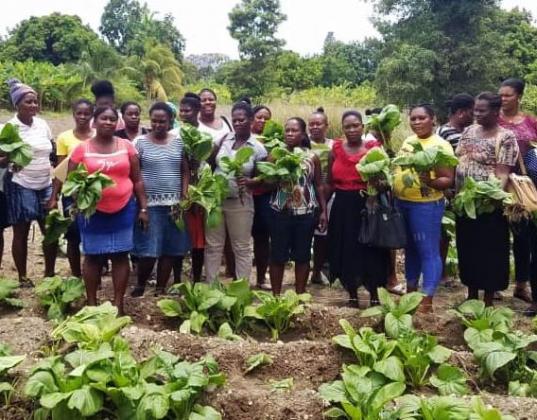
By: Johnny Morgan, jmorgan@agcenter.lsu.edu
BATON ROUGE — A nutritionist with the LSU AgCenter School of Nutrition and Food Sciences has joined forces with the University of Florida Institute of Food and Agricultural Sciences to improve nutrition for Haitian citizens.
Elizabeth Gollub, AgCenter nutrition specialist, recently returned from a week in the island nation, where she provided training on the health benefits and preparation of Asian spinach.
“Our program was designed to encourage women and children to consume Asian spinach; to improve their intake of key nutrients,” Gollub said.
The nutrition education component was developed as a training module to be implemented in conjunction with the introduction of Asian spinach seed and planting instruction to augment household or neighborhood gardens or farms, she said.
Issues and products associated with nutrient content and storage of rice, corn, beans and peanuts were also covered.
The training was part of the year-four module of a five-year United States Agency for International Development grant.
“We held three training sessions that targeted female farmers and gardeners recruited through local cooperatives,” she said.
The nutrition education module and the impact of the training were evaluated for content comprehension and presentation suitability and will be evaluated for behavior change.
“If results are encouraging, the module will be refined to reflect evaluation findings, and this approach will be applied to other communities and other vegetables in 2020, which will be the fifth year of the project,” Gollub said.
The purpose of the training module was to familiarize the women farmers with Asian spinach as an easy- to-prepare, palatable vegetable that could be added to meals to provide key health-promoting nutrients.
“The goal of the training is to motivate the consumption of Asian spinach among this group of women and their children,” she said.
Topics covered during the training included nutrient content of vegetables, the relationship of nutrients to growth and health and the relevance to children and to self.
Asian spinach is known to be a particularly good source of vitamin C, vitamin A, calcium, potassium, folate and a variety of other compounds with antioxidant activity.
It is also a reasonably good source of iron, potassium and several B vitamins.
“The underlying message will be the importance of these nutrients to growth, development and a robust immune system, especially in children and women of childbearing age,” she said.
Gollub plans to return to Haiti in six months to do additional training with the female farmers.
